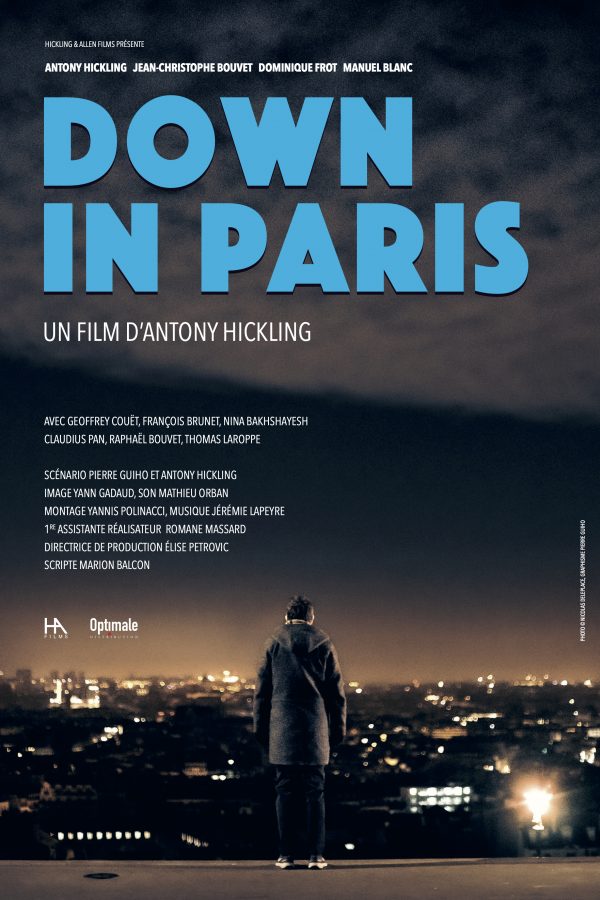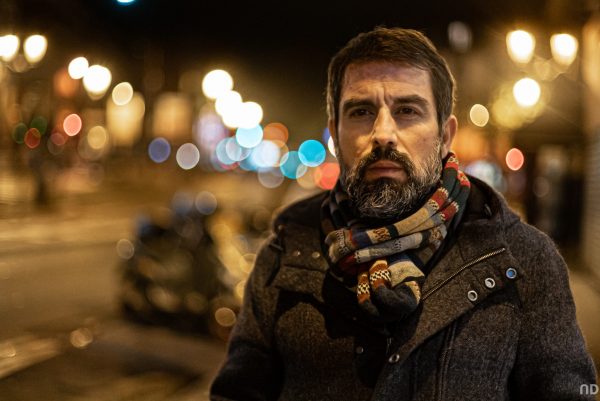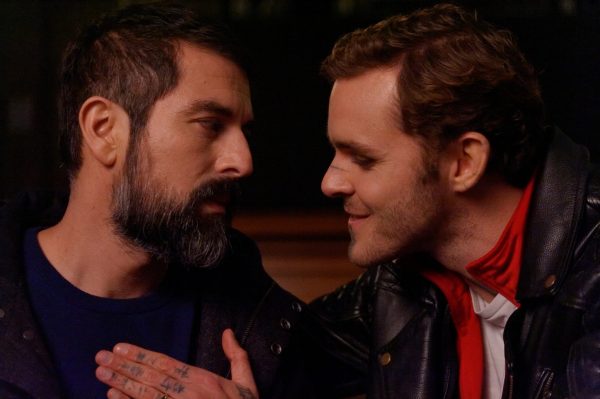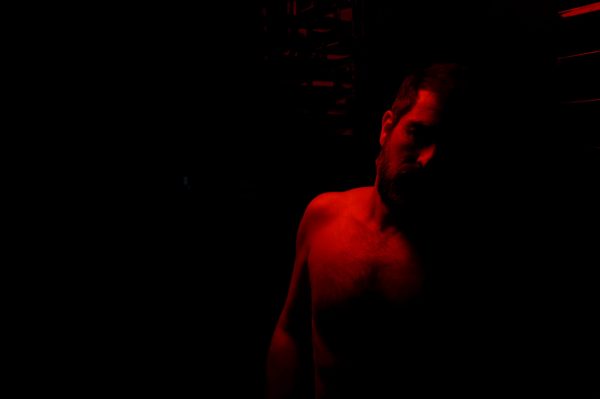‘Down in Paris’ recounts the recovery of lost personal power

“Down in Paris” (2021). Cast: Antony Hickling, Jean-Christophe Bouvet, Dominique Frot, Manuel Blanc, Geoffrey Couët, François Brunet, Nina Bakhshayesh, Claudius Pan, Raphaël Bouvet, Mike Fédée, Thomas Laroppe. Director: Antony Hickling. Screenplay: Antony Hickling, Pierre Guiho and Raphaël Bouvet. Web site. Trailer.
Recovering what we’ve lost can be a challenging pursuit. What’s more demanding, however, is searching for something we’ve lost that we don’t realize is missing. This can be especially problematic when it involves our sense of personal power, for its absence can leave us vulnerable to all manner of issues that we don’t know how to fix because we’re unaware of what’s lacking to make restitution. Such is the dilemma faced by a searching middle-aged artist in the compelling new French character study, “Down in Paris.”
No matter how hard he tries to make things work, filmmaker Richard Barlow (Antony Hickling) just isn’t feeling it when it comes to his latest picture. After a difficult and frustrating day of filming, the English director, who lives and works in Paris, struggles to wrap up the day’s shooting schedule, but nothing seems to go right. He can’t quite pinpoint the trouble, either, but every alteration he attempts to make leaves him dissatisfied, even after 15 takes on shooting one scene. He paces around the set like a caged animal, irking or intimidating everyone around him. Richard’s assistant, Simon (Geoffrey Couët), tries to help, but the director is so wired that his aide’s suggestions fall on deaf ears. Indeed, Richard seems to be in the midst of a full-fledged anxiety attack. Finally, in light of the disastrous way things are going, Richard’s producer, Maurice (François Brunet), intervenes to avoid a complete meltdown on the set, sending the filmmaker home for the night to compose himself and get some rest for a fresh start the next day.
Richard leaves the studio and begins wandering the streets of Paris. Little does he know that he’s about to embark on a night-long odyssey that will change his life – and him. He first wanders into a bar for a quick drink where he meets Elizabeth (Nina Bakhshayesh), a fellow Brit who unsuccessfully makes a play for Richard, unaware that the filmmaker is gay. They nevertheless share a friendly conversation that helps to lift Richard’s spirits, putting him a seemingly better mood for the evening.
Upon leaving the bar for a previously scheduled meeting, Richard has a chance encounter with his ex-boyfriend, Frédéric (Raphaël Bouvet), and his new partner, Tom (Thomas Laroppe). While the conversation starts out innocently enough, Richard and Frédéric quickly come to blows, rehashing old hurts, many of which Richard apparently tolerated more than he should have. Fortunately, a passing Samaritan steps in, breaking up the altercation and enabling Richard to continue on to his appointment.
Like his conversation with Elizabeth, Richard’s previously scheduled engagement helps to calm him down. That meeting is with his friend Samantha (Dominique Frot), a spiritual advisor and Tarot card reader. During their session together, Samantha discovers that Richard has been shouldering the weight of a number of recent losses, most notably his breakup with Frédéric and the agonizing death of his father, who succumbed to cancer. not long ago Samantha notes that Richard’s pain is palpable and that her previous prediction about Frédéric being a source of trouble had indeed come true. However, she adds that the cards say good things lie ahead for her friend as long as he’s willing to be open to them, primarily by letting go of the past and allowing his true self to shine through. Richard acknowledges that Samantha’s observations are on target and that, while some of what she said may have been difficult to hear, he knows these are issues he must address. The upshot of this is that it places him in a better frame of mind, one in which he appears to be more willing to be honest with himself and to follow the advice Samantha gave him.
After leaving his meeting with Samantha, Richard is in a better mood but not ready to head home. He decides to continue wandering the streets of Paris, a journey during which he experiences a number of encounters that bring him face to face with himself and provide him with a greater sense of personal clarity. He first stops in a church, where he has a spiritual awakening of sorts after a bewildering conversation with a mysterious stranger (Claudius Pan), one in which he’s forced into addressing his fears, doubts and insecurities. He then comes to the rescue of an old man (Jean-Christophe Bouvet) who’s harassed by a pair of punks in a late night eatery, an incident that leads to a profound but brutally honest chat. He subsequently pays a visit to an old friend, Mathias (Manuel Blanc), someone whom he sincerely believes he once egregiously let down; engages in an explicitly erotic encounter with an intergenerational couple in a gay bar; and experiences a surreal, apparitional episode along the banks of the Seine with a young boy who seems eerily familiar. He even has another chance meeting with Elizabeth that proves to be uncannily prophetic.

Above all else, though, the night’s adventures turn out to be remarkably revelatory. And, as morning approaches, Richard starts his day with a sense of renewal about himself, his fortunes and even his movie. But will circumstances play out in his favor, providing him with what he seeks and what Samantha foresaw? That’s what he’s about to find out.
Of course, the key question here is, “Why shouldn’t things play out in Richard’s favor?” And, for that matter, why shouldn’t they play out in anyone’s favor? Many of us routinely ask ourselves why our lives aren’t panning out as hoped for. We accept disappointments and discouragement, often settling for less than what we want, sometimes to a great degree. But why are we so willing to do that and not take a closer look at what’s preventing the emergence of the results we desire?
In many respects, that’s what Richard is up against. Despite his obvious flair for creativity, as evidenced by his film work, he somehow fails at being creative enough to resolve the shortcomings in his personal life. And, as becomes apparent through this story, that appears to be attributable to his inability and/or unwillingness to take a good, hard look at discovering the nature of his true self, his inner being, that from which everything in his existence originates.
Introspection is crucial to understanding oneself, particularly where our beliefs are concerned. And this is important because our thoughts, beliefs and intents are the building blocks of our reality, the foundation from which it springs as a result of the conscious creation process, the philosophy that makes this outcome possible.
Richard’s failure to so engage with himself is keeping him from fully realizing his dreams and fulfilling his potential. To a great degree, this has to do with one set of beliefs that’s especially critical – those associated with the management of his personal power, for how well we wield it determines how effectively our beliefs and existence align. Based on Richard’s session with Samantha and his other conversations throughout the night, as well as his contentious interaction with Frédéric, it’s fairly obvious he has a history of either failing to fully tap into his power or, even worse, giving it away to others. That being the case, it’s no wonder he is (and has been) unhappy with certain aspects of his life.
While this issue of disempowerment has primarily involved Richard’s personal dealings, his frustration on the movie set is an indication it may be starting to creep into his artistic life as well. Sadly, he now appears to be experiencing difficulties in an area where they previously hadn’t existed, adding to his burden and exacerbating his overall sense of exasperation.

One might wonder what’s behind such a change, but perhaps it’s his inner self’s way of trying to get his attention, prompting him to examine the source of his frustration by nudging him to look at the beliefs driving it, especially now that it’s beginning to show up where it had previously been absent. The issue’s systemic growth within him is like a metaphysical virus, attacking one part of his being as a means of drawing attention to another that has been afflicted but ignored for far too long. This may not be the easiest way to approach this problem, but, as an internal cry for help, it’s forcing Richard to get to the root of the issue in order to resolve it.
It would be in Richard’s best interests to pay attention, too, for the more he resists, the more arduous the process becomes. That’s apparent through the appearance of a number of the challenging situations that arise during his night of wandering around Paris. His confrontation with Frédéric, the personal attack from the stranger in the church and the somewhat tactless honesty of the old man in the restaurant, for instance, are all examples of incidents that his inner self has drawn into his existence to facilitate addressing his empowerment issues. The question for Richard is, “Will he recognize them for what they are and what they’re intended to accomplish?” How well he does or doesn’t succeed at this will help to determine how effective he will be at resolving his empowerment issues and instituting the requisite changes he needs to make to alter his reality to his liking.
By making changes in his beliefs and enabling his altered true self to embrace them, Richard has an opportunity for a brighter future. The seeds of that are apparent in his Tarot reading. Samantha shows him that he need not accept reality as it has historically unfolded; a better, brighter, more fulfilling future is indeed in the cards – literally – as long as he’s willing to do the work to bring it about. For that to happen, though, he must also sweep away what no longer works, and his night on the town in Paris is designed to help point the way toward such an outcome, even if that scenario doesn’t materialize in the way he expected at the time. For Richard’s sake, we can only hope he reads between the lines successfully enough to see what’s really transpiring.
Should Richard pass the test, he should be able to reclaim his power, and, by doing so, he has an opportunity to reshape his life in all areas, not just those in which he previously developed proficiency. That would enable him to become the individual he truly wants to be. Change is truly possible, and Richard now has the chance to at last discover that for himself.
This is undoubtedly an important message for everyone, but I find it particularly poignant for members of the LGBTQ+ community, for several reasons. To begin with, this constituency has long suffered from disempowerment issues, and, even though measures aimed at rectifying this problem have become more prevalent in recent years, many community members are still relatively new at coping with such matters and could definitely stand to benefit from inspiring examples like this.

But, perhaps more importantly, this film is significant by encouraging LGBTQ+ community members to get better acquainted with their true selves overall. While honestly addressing orientation questions is certainly a key concern for community members, this consideration is only a part of what makes such individuals who they are; there is much more to their inner selves than sexuality, and those aspects deserve just as much attention, for they determine who those individuals become just as much as their orientation does. “Down in Paris” does a superb job of addressing this, and I applaud the film for doing so. It shows that being gay, lesbian, bisexual, transgender or queer is part of what someone might be, but it also makes clear that it is only a part – that there’s much, much more to an individual’s nature. In this regard, I salute this picture for taking LGBTQ+ cinema in a new direction, one that embraces a wider view of what constitutes films in this genre, particularly what they can and should seek to incorporate. I sincerely hope this is the start of a promising new trend.
Finding ourselves is something we all must do, including members of the LGBTQ+ community. Such is the case in this excellent boundary-pushing character study from writer-actor-director Antony Hickling. Through the protagonist’s numerous encounters over the course of one night in Paris, viewers witness a somewhat lost gay man come into his own as a fully self-actualized individual, one who seeks to understand and take control of his destiny, an inspiring example for anyone who has ever felt in need of direction to get his or her life on track toward a path of satisfaction and fulfillment. While the pacing lags a bit in a few sequences, the film does a generally fine job of keeping the narrative moving and engaging without lapsing into dry, protracted talky scenes that weigh down the work. This impressive offering does much to expand the scope and perspective of what constitutes gay cinema, but one need not be a member of the LGBTQ+ community to appreciate what it has to impart. Sensitive viewers should be aware, however, that the picture contains some sexually explicit content.
Finding “Down in Paris” may take some effort, at least initially. While it has been generally released in its native France, it has been (and for the near future will be) primarily playing at film festivals, such as at the recently concluded Reeling Chicago International LGBTQ+ Film Festival, where I screened it. However, should it go into widespread distribution elsewhere, either in theaters and/or online, I heartily recommend it.
Personal power is something we may not fully appreciate until it’s gone. That’s especially true when we fail to recognize its importance and the role it plays in shaping the existence we experience. However, that’s not to suggest all is lost as long as we’re willing to make the effort to retrieve it and put it to use before it’s too late. And, fortunately, that can happen in unexpected yet remarkably revelatory ways, sometimes by simply partaking in undertakings as improbable as spending a night on the streets of Paris. Of course, we shouldn’t be surprised what can happen in the City of Lights, especially when this magical venue takes on the role of “City of Enlightenment.” Richard can be thankful for this opportunity, provided he avails himself of it and understands what it’s trying to teach him. After all, once he considers what could be awaiting him, the loss of a little sleep and the challenges of a few consciousness-stretching, button-pushing exercises should seem like quite a bargain by comparison.
Copyright © 2021, by Brent Marchant. All rights reserved.



